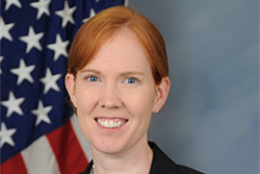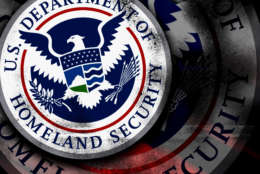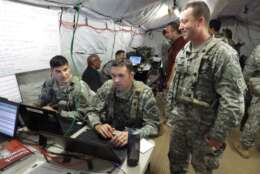Cybersecurity
-
The National Background Investigations Bureau plans 'human testing' this fall to improve the federal security clearance process.
September 07, 2017 -
The State Department is reconsidering whether it really needs a diplomat to coordinate cybersecurity policy. Brookings visiting fellow Cameron Kerry says State should be enhancing the position, not getting rid of it.
September 06, 2017 -
Sean Westbrook, a digital media manager and content writer for True North ITG, makes the case for why agencies should move to the cloud sooner than later.
September 05, 2017 -
The White House’s American Technology Council is seeking comments on its draft plan to move agencies off legacy IT.
September 05, 2017 -
Putting CYBERCOM on an even playing field with the rest of the Defense Department's combatant commands has serious implications.
September 01, 2017 -
Tony Cole, vice president and global government chief technology officer for FireEye, said threat intelligence will help agencies mitigate risks by answering some basic questions about who the attackers are and what they are trying to do.
August 31, 2017 -
The Pentagon's new Cyber Excepted Service will extend the probationary period for new employees to three years and give hiring managers more flexibility to recruit candidates.
August 30, 2017 -
DHS issued an updated CDM supply chain risk management plan to help agencies be more confident in the cybersecurity products and services they are buying.
August 30, 2017 -
The Army Cyber Center of Excellence became fully operational on Aug. 9 and published in April its first doctrine for how it fights in cyberspace to include electronic warfare.
August 28, 2017 -
GSA and DHS opened up the special item number under the IT Schedule and issued the first task order under Allilant for the governmentwide cyber program.
August 28, 2017 -
The FBI arrested Pingan Yu, who they say is a malware broker in the People's Republic of China.
August 25, 2017 -
Vincent Groh, the CIO of the Millennium Challenge Corporation, said by moving to the cloud he cut MCC’s spending on data centers by half.
August 25, 2017 -
The Naval War College recently conducted a Navy-Private Sector Critical Infrastructure Wargame to test U.S. defenses against a major cyber attack.
August 24, 2017 -
White hat hackers discovered 207 verified vulnerabilities in Air Force systems, including some very serious ones.
August 23, 2017 -
The authors of a new report for the National Infrastructure Advisory Council say their diagnosis of the federal government's cyber problems is nothing new.
August 23, 2017















